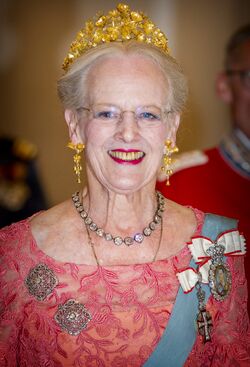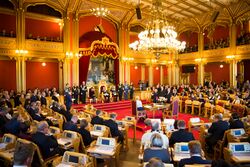Monarchy of Geatland
| Queen of the Geatish Realm | |
|---|---|
| Götiska rikets Drottning | |
| Incumbent | |
 | |
| Brunhild since 16 September 1970 | |
| Details | |
| Style | Her Majesty |
| Heir apparent | Vilhelm, Prince of Blåstad |
| First monarch | Alrik (legendary) Gorm the Elder (ancient) Eric the Great (modern) |
| Residence | Freiburg Palace |
| Appointer | Hereditary |
The monarchy of Geatland is a constitutional and political institution in which a hereditary officer rules as the head of state and sovereign of Geatland within the parliamentary system. The Geatish monarchy has been a political fixture on the Geatish Islands since time immemorial, with scholars disagreeing on when exactly it began. The current monarch is Queen Brunhild, who has occupied the position since her accession in 1970.
The monarchy of Geatland has legendary origins. Alrik, King of the Geats, a figure of from legend, is often cited as the first monarch for having united the Geatish tribes in the 1st century AD. Most scholars contend that the beginning of the Geatish monarchy lies with Gorm the Elder, who defeated the Gutes in the Städ War and assumed control over the whole of the Geatish Islands in 944. The Geatish monarchy fractured in the 13th century, with many claimants rivaling each other's claims during the Brutish Wars, until Eric the Great reunited Geatland in 1545, inaugurating an absolute monarchy. The absolute monarchy persisted until 1867, when the Constitution of Geatland was signed following the Engström Revolt. The Constitution and the succeeding era limited the monarch's power, though monarchs continued to exercise significant political influence. Reforms following the Great War reduced the monarchy to a ceremonial role.
Conventions and laws, such as the Constitution, regulate the monarch's succession and powers. Officially, the monarch is invested with a wide range of powers but refrains from intervening in politics, which are directed by elected officials responsible to the public. The monarch is the commander-in-chief of the Geatish Armed Forces, the nation's fount of honour and the governor of the Church of Geatland. The monarch exercises her powers and prerogatives on the advice of government ministers and the Privy Council.
History
Constitutional role

The monarch of Geatland is the head of state and symbol of the nation. The person of the monarch is the representation of the Geatish state, and her image appears on official state documents and legal tender. Portraits of the monarch are often hung in government buildings in Geatland, as well as embassies of Geatland to foreign nations. The monarch is responsible for accrediting ambassadors from foreign nations and receiving foreign heads of states, and she represents Geatland in international conferences between heads of state. Additionally, the monarch is often referred to as the "father" or "mother" of the Geatish people, responsible for advising and, if necessary, warning the government.
The Constitution of Geatland vets ultimate legislative, executive and judicial power in "the Crown" (Geatish: Kronan), a corporation sole consisting of the person of the reigning monarch:
Supreme executive, legislative, and judicial authority is vested in the Crown, to be exercised by the Monarch or by the ministers he shall appoint, and by the Riksdag and the King-in-parliament, and by the courts and officers of the courts that the law shall establish - Article II, sec. 1 of the Constitution of Geatland
Constitutionally, however, the powers of the Crown are diffused among the Riksdag, cabinet, and the courts. Officially, the monarch has very few nominal restriction on her power; the Constitution of Geatland stipulates that the monarch cannot raise taxes or organize armies without parliamentary consent. Nevertheless, the monarchs that succeeded the Constitution of Geatland have chosen to surrender power to the democratically elected Riksdag and the government. Accordingly, the monarch is not involved in the governance of the nation, and her powers are executed by government ministers in her name. The monarch's direct powers as they pertain to government are only exercised at the direction of ministers, chiefly the premier. Most of the monarch's day-to-day business involves non-partisan state activities, such as hosting receptions and conferring medals.
Assembling and dismissing a government
The monarch's most important state duty is appointing the premier of Geatland, as well as appointing the ministers of the Cabinet of Geatland on the premier's advice. The Constitution of Geatland stipulates only that the premier and his cabinet be able to command the consent of the Folkting, and the monarch is technically able to appoint whomever she wishes to the position. However, convention dictates that the monarch invite the leader of the largest party or coalition in the Folkting to form a government in her name. The premier's investiture usually occurs in a private audience between the monarch and the premier, wherein the monarch will formally ask the premier-designate to form a government. If the candidate accepts, the premier will swear loyalty to the monarch and submit to the monarch a list of ministerial appointments. The monarch's appointee is understood to command the tacit consent of the Folkting, and is not subject to an automatic confidence vote.
The monarch receives weekly audiences from the premier and is informed of the affairs of state. The monarch may also requisition the advice of any other minister if she wishes. Ministers, including the premier, serve at the pleasure of the monarch and may be dismissed by her for whatever reason. In practice, however, the monarch will only dismiss a government if it has lost a vote of confidence in the Folkting, and if the monarch believes another member of the Folkting may be able to command the confidence of the Folkting. Furthermore, the monarch will only dismiss ministers on the advice of the premier, though it is not unprecedented for the monarch to refuse such a request. For instance, during the 1996 Björn Larssen scandal, Queen Brunhild refused Premier Oscar Ekman Frisk's request to fire Minister of Justice Axel Torvalds, who was conducting an investigation into Paulsson's government.
Summoning and dissolving the Folkting
The Constitution of Geatland grants the monarch the power to summon, proroge, and dissolve the Folkting, the elected lower house of the Geatish Riksdag:
The monarch shall have the right to call forth and dissolve the Folkting for such reasons as he may deem fit, and to schedule elections for the Folkting, but no Folkting shall be seated that has not been duly elected among the people, and no change may be made to the manner in which the members of the Folkting shall be drawn and selected from the public without their consent - Article III, sec. 3 of the Constitution of Geatland
The Geatish Folkting sits for no more than five years in a single term, after which it is automatically dissolved. However, the sitting premier may request that the monarch dissolve the Folkting early and schedule snap elections. The monarch is obliged by convention to accept the premier's advice. Furthermore, if no person in the Folkting is able to demonstrate that they are able to command the confidence of the body, the monarch may dissolve the Folkting on her own initiative and, if necessary, appoint a caretaker government.
The monarch opens the first session of a newly-seated Riksdag, delivering a speech from the throne outlining the government's objectives. By convention, the monarch does not attend any other sittings of either house of the Riksdag.
Royal prerogative
The Constitution of Geatland vests a wide range of powers into the monarch's person. These powers include the appointing of ministers and judges, the signing of laws and ratification of treaties, the authorization of military deployments and the direction of armed forces, the issuance of royal decrees to clarify the execution of laws and regulate the civil service, and the impounding of land for state use. Known as the monarch's royal prerogatives, these powers technically do not require parliamentary approval.
Nevertheless, the monarch is constrained by democratic conventions to act only on the direction of government ministers and parliament. For example, while the monarch reserves the right to issue royal decrees unilaterally, royal decrees are usually written and signed by the cabinet minister responsible, or by the premier, with the monarch only countersigning. Furthermore, prerogative powers such as decrees may be overruled by an act of the Riksdag.
The monarch is the commander-in-chief of the Geatish Armed Forces and the chief justice of the Realm. The monarch appoints commissioned officers, state prosecutors and judges on the advice of the ministers responsible or the Judicial Appointments Commission. In practice, command of the armed forces is exercised by the defense minister and the cabinet, while final judicial appeals are decided in the Appellate Council of the Landsting.
All laws passed by the Riksdag require royal assent to become law. Theoretically, the monarch can deny assent, and the bill will not become law. Convention dictates that the monarch always grant assent, and no monarch has refused assent to a law since the end of the Great War.
There are powers over which the monarch can wield more personal influence. For instance, the composition of the Privy Council may be regulated by the monarch. The monarch retains significant control over the Crown's estates and its finances, with government supervision. The monarch has significant control over her pardon powers, and may chose to pardon offenders without prior government approval. As the nation's font of honour, the monarch has the power to create knights and confer honors. Most honors are conferred on the advice of government ministers or advisory councils, though the monarch may choose to accord titles or honors as a person thanks without government prompting. The monarch has the sole authority to create and destroy peerages. Some Geatish orders of chivalry, such as the Order of Eric the Great and the Order of Christina, are awarded on the monarch's sole discretion.
